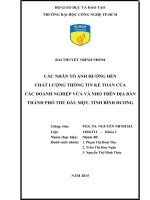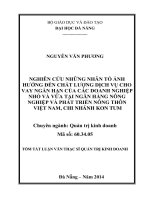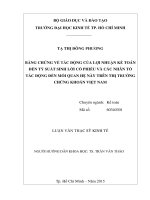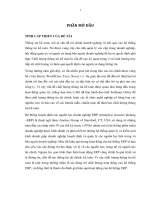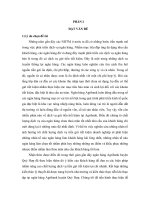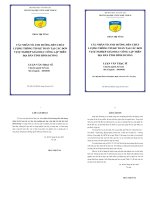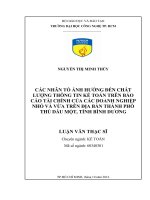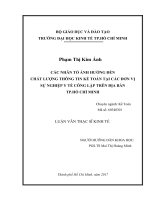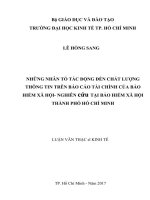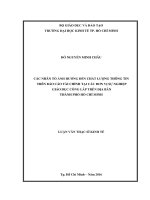Nghiên cứu các nhân tố ảnh hưởng đến chất lượng thông tin trên báo cáo tài chính của các công ty niêm yết trên thị trường chứng khoán việt nam tt tiếng anh
Bạn đang xem bản rút gọn của tài liệu. Xem và tải ngay bản đầy đủ của tài liệu tại đây (190.04 KB, 12 trang )
1
2
CHAPTER 1
INTRODUCTION OF THE THESIS TOPIC
efficiency of information users as well as the performance of the stock market.
However, in recent time, there are many frauds regarding the information quality in
FS which caused serious consequences and great losses for companies and investors.
1.1. Urgency of thesis topic
Currently, Vietnam is integrating deeper into the world market. The
development of Vietnamese stock market (SMVN) has played a significant role in the
development of the economy in general and created a borderless capital flow. SMVN
is one of young stock markets in the world; it was officially put into operation on July
20, 2000 via the Ho Chi Minh Stock Exchange (HOSE) and Hanoi Stock Exchange
(HNX). The development of the stock market during the period of 2000-2005 was
quite small with the value of market capitalization of just under 1% of GDP. The
market size had grown by leaps and bounds to 22.7% of Gross Domestic Product
(GDP) in 2006, over 43% of GDP in 2007 and by now to 78% of GDP, respectively.
This provides a channel for listed companies to mobilize capital and provides
opportunities for investors to seek reasonable investment methods on the stock
market. Financial statements (FS) are an important basis for providing information
for investors and related parties to make optimal decisions as financial information of
the company is provided on the financial statements.
From a theoretical perspective, the main objective of the financial statements is
to provide high-quality information but this is a complex multi-dimensional structure
that cannot be observed directly (Barth, Landsman and Lang, 2008). The
measurement outcome depends heavily on personal preferences, perceptions and the
context of the information (Schwedler, 2010). Quality of financial reporting
information is mentioned in many national accounting standards and many research
works of Jonas and Blanchet (2000), Cohen et al. (2004), Beest et al (2009), Nguyen
Trong Nguyen (2015), Nguyen Phuong Hong (2016), Pham Quoc Thuan (2016).
From the perspective of FASB and IASB, qualitative characteristics are attributes that
make the information on the FS useful for users. As for Vietnam, in the context of
being a developing economy and undergoing integration in terms of capital and
accounting standards, it is necessary to study, correct and develop a measurement
scale of information quality to comprehensively assess information in the FS.
From a practical perspective, every change in business and financial situations
of listed companies affects not only the operations of companies and investors but
also the whole stock market as well as the economy. This applies especially for
information in the FS because this is an important source of information not only for
company executives but for those who are interested in the “health” of companies as
well in order to make appropriate decisions. This directly affects the quality and
It is essential to study factors affecting of quality of financial reporting
information and the influence level of these factors to provide recommendations
and improve information quality. Therefore, the author chooses the following
topic which has both theoretical and practical significance: “A study of factors
affecting the quality of financial reporting information of listed companies on the
Vietnamse stock market”.
1.2. Research objectives
Overall objective: To study factors affecting the quality of financial reporting
information of listed companies on the SMVN; then present recommendations for
influencing factors to improve information quality.
The thesis has the following specific objectives:
Objective No.1: To create the measurement scale of the quality of financial
reporting information of listed companies on the SMVN.
Objective No.2: To identify factors affecting quality of financial reporting
information of listed companies on the SMVN.
Objective No.3: To identify the influence level and direction of factors on the
quality of financial reporting information of listed companies on the SMVN.
Objective No.4: To present several recommendations to enhance the quality of
financial reporting information of listed companies on the SMVN
Objective No.5: To study the assessment of the makers and users of FS about
the quality of financial reporting information and factors affecting the quality of
financial reporting information of listed companies on the SMVN.
1.3. Research questions
Regarding the specific study objectives of the thesis, the following questions
are presented:
Question No.1: How is the quality of financial reporting information of listed
companies on the SMVN?
Question No.2: What are factors affecting the quality of financial reporting
information of listed companies on the SMVN? What are their influencing levels and
directions about the quality of financial reporting information of listed companies on
the SMVN?
3
Question No.3: What is the most influential factors of the quality of financial
reporting information of listed companies on the SMVN?
Question No.4: What are recommendations for influencing factors to enhance
the quality of financial reporting information of listed companies on the SMVN?
Question No.5: Are there any differences in the assessment of FS makers and
FS users regarding information quality and factors affecting the quality of financial
reporting information of listed companies on the SMVN?
1.4. Research objects and scopes
Research objects: Factors affecting the quality of financial reporting
information of listed companies on the SMVN
Research scope:
Space: Study non-financial listed companies in HOSE and HNX
Time: To ensure research time, the source of research data includes survey
results of respondents about quality of financial reporting information of nonfinancial listed companies within 3 months from May 15, 2018 to August 15, 2018.
Respondents: Users of FS of listed companies on the SMVN (investors,
management agencies, auditors, specialists) and makers of the FS in listed companies
on the SMVN (accountants, chief accountants, directors of listed companies)
1.5. Introduction of research methodologies
The thesis combines qualitative research methods and quantitative research
methods to achieve research objectives.
Qualitative research method: The thesis uses in-depth interview techniques
and group discussion with experts to identify suitable criteria to evaluate and measure
quality of financial reporting information and factors affecting quality of financial
reporting information of listed companies in SMVN.
Quantitative research method: The quantitative method is carried out
through two stages: preliminary survey and wide-area survey phases; survey data are
analyzed by the SPSS 22.0 software.
1.6. Contributions of the thesis
In terms of theories:
Firstly, adjust and develop a comprehensive measurement scale of information
quality on FS based on basic and advanced qualitative characteristics of IASB (2018).
Secondly, the thesis uses qualitative and quantitative research methods to identify
factors affecting the quality of financial reporting information of listed companies on the
SMVN and the levels of impact. This helps enrich the overview of research and research
results about these factors.
4
In terms of practical application, the thesis has the following contributions
Firstly, the research results reflect the reality of quality of financial reporting
information of listed companies based on a comprehensive approach to measurement
characteristics of information quality information in the FS according to IASB 2018.
Some new indicators are developed in this study. The research results show that the
quality of financial reporting information of listed companies on the SMVN is at a
relatively good level of 3.4069/5 points. In general, the quality of financial reporting
information meets the requirements of information users when making decisions.
Secondly, the results of regression analysis of the topic have identified six
factors including five factors have the same impact directions: accounting staff,
efficiency of internal control, independent audit quality, application of International
Financial Reporting Standards (IFRS), regulatory role of the State Securities
Commission (SSC). In particular, the profit management behavior factor inversely
affects the explanation of 72.9% of quality of financial reporting information of listed
companies on the SMVN. There are two factors that are considered to be new in this
study: the application of IFRS and the regulatory role of the SSC. The accountant
factor have observed variables about accounting ethics (DD1, DD2, DD3, DD4,
DD5) and NL2 that are discovered in this study.
Thirdly, the research results show that there are different assessment of FS makers
and users about quality of financial reporting information. There are two factors, namely
independent auditing quality and the application of international financial statements
standards that do not display statistically significant differences.
Fourthly, based on the research results and discussion of the research results,
the thesis has proposed recommendations for six independent factors to enhance the
quality of financial reporting information of listed companies on the SMVN.
1.7. Structure of the thesis
The thesis includes 5 chapters:
Chapter 1: Introduction of the thesis topics
Chapter 2: Research overview and the theoretical basis of information quality
of the financial statement
Chapter 3: Research methodologies
Chapter 4: Research results
Chapter 5: Disussions of research results and recommendations
List of reference materials
Appendix
5
CHAPTER 2
RESEARCH OVERVIEW AND THE THEORETICAL BASIS OF
INFORMATION QUALITY OF OF THE FINANCIAL STATEMENT
2.1. Research overview
2.1.1. Studies on the measurement of information quality of the financial
statement
There are many different methods to evaluate and measure quality of financial
reporting information; 4 commonly used methods are presented in Table 2.1.
Method
Pros
Cons
Author
Table 2.1. Overview of measurement methods of information quality of
the financial statements
Method of assessing
Method of using the relation between
A specific
Qualitative
profit
profit and market factor in the FS
characteristic
response
Asses the profit
Consider the
Have in-depth
Examine the
adjustment level relationship between analysis of
usefulness of FS
of the executive
profit and response specific factors
decision through
(representative)
of the SM to
in the FS by
qualitative
measure quality of
conducting
characteristics
financial reporting
empirical
information
research
Easy to collect Relatively easy to
Focus on quality Focus on quality of
data to measure measure. Provides
of financial
financial reporting
profit adjustment. an insight into the
reporting
information .
economic value of
information .
Directly measure
income figures
Directly measure quality of the FS
quality of the FS
Focus on profit Focus on profit Focus only on It is generally
quality.Measure
quality.
Measure the
selected difficult
to
information
information quality factors. Difficult measure
quality indirectly indirectly.
Not to measure
Difficult
to provide an insight
estimate
into the trade-off
cumulative values between relevance
arbitrarily
and reliability
Jone
(1999). Barth et al (2001); Hirst
et
al Jonas et al (2000),
6
Method of assessing
Method of using the relation between
profit
profit and market
response
Healy &Wahlen Choi et al (1997);
(1999); Dechow Nichols & Wahlen
et al (1995); (2004);
Nelson
Radzi
et
al (1996).
(2011), Nguyen
Ha Linh (2017).
A specific
factor in the FS
Qualitative
characteristic
(2004); Beretta
&
Bozzolan
(2004); Cohen et
al
(2004),
Roudaki 2011,
Hirschey et al
(2012).
Schipper &Vicent
(2003);
Vander
Meulen et al (2007);
Barth (2006); Ferdy
et al (2009); Geert
Braam & Ferdy
(2013), Pham Quoc
Thuan
(2016),
Nguyen
Phuong
Hong & Duong
Khanh Linh (2014),
Nguyen
Trong
Nguyen (2016)
Source: Complied by the author
2.1.2. Studies of factors affecting quality information of the FS
2.1.2.1. Internal factors of companies
There are many factors that affect information quality of financial statements. In
this study, the author has complied the following internal factors: accounting staff
competence, professional accounting ethics, internal control, level of dispersion of
shareholders, company size and financial leverage, earning management behavior, quick
solvency, company culture, commitment to business ethics, business characteristics
2.1.2.2. External factors of companies
Application of IFRS, independent audit quality, regulatory roles of the SSC
2.1.3. Research gap
1. Study the the impact of accounting ethics on the quality of financial
reporting information of listed companies on the SMVN.
2. Study the impact of apply IFRS on quality of financial reporting
information of listed companies on the SMVN
3. Study the impact of the regulatory role of the SSC on quality of financial
reporting information of listed companies on the SMVN.
7
4. Do the FS makers and users have different assessments on the quality of
financial reporting information and its influencing factors on the SMVN?
5. What are recommendations from the research results to improve information
quality on the financial statements?
2.2. Financial statement and information quality of financial statement
2.2.1. Financial statement
2.2.1.1. Overview of financial statement
The thesis’s approach about FS is according to the concept of IASB (2018) as
Vietnam is currently on a roadmap to gradually integrate with international
accounting and step by step apply IFRS in listed companies with a view to
compulsory application for all listed companies by 2025. According to this approach,
financial statements are reports on the situation of assets, capital, revenue, expenses,
business results and financial relations of companies at a specific point of time after
an operation period.
2.2.1.2. Financial statement users
The thesis' viewpoint is to consider the users of financial statements according
to the approach of IFRS with priority given to investors and capital providers who
have less information on production, business and financial situation of companies.
2.2.2. Information quality of financial statement
2.2.2.1. Information quality
In brief, information includes signals that are received, perceived and useful for
users during the decision-making process.
Quality
Due to the above-mentioned reason, the thesis chooses the approach according
to the viewpoint about information quality of professional accounting organizations
such as FASB, Vietnamese Accounting Standards, and the International Accounting
Standards Board (IASB) to analyze and choose the most suitable standards of quality
of financial reporting information .
2.2.2.2. Quality information of financial statements
a. Basic characteristics
Relevance, faithful representation
b. Advanced characteristics
Comparability, understandability, timeliness
2.3. Theories about the relation among factors affecting information
quality of financial statements
8
2.3.1. Contingency theory
Theoretical application in this study:
Contingency theory shows that there is no optimal organizational structure for
listed companies on the SMVN. There are many factors affecting the effectiveness of
the organizations in general and the quality of financial reporting information of
these companies in particular. That helped the author form the idea about the impact
of factors of company size, corporate culture, quick solvency, financial leverage,
commitment to business ethics, business characteristics on quality of financial
reporting information of listed companies on the SMVN.
2.3.2. Agency theory
Theoretical application for quality of financial reporting information of listed
companies on the SMVN
The agency theory is used to explain managerial behavior in providing
information in the financial statements to ensure reliability for the benefit of the
owner or to maximize the benefits of the principal. In the event that the contract
between the owner and the manager is effective and the interests of the executives
are guaranteed, they will act entirely in the interests of the principal, disclose a lot
of information with high quality and reliability in the FS and vice versa. From
that, the author has realized that executives can perform earning management
activities to maximize their by providing information on the FS, especially for
listed companies in case the management rights and ownership rights are separate.
Or there is a relation between earning management behaviour and quality of
financial reporting information of listed companies on the SMVN. Therefore, the
thesis continues to explore the relationship of these two factors. Based on the
analysis of this theory, the author has studied the relation among the factors of the
effectiveness of internal control, independent audit quality, regulatory role of SSC,
dispersion level of shareholders, competency of accountants, professional ethics of
accountants, earning management behavior regarding quality of financial reporting
information of listed companies on the SMVN.
2.3.3. Stakeholder theory
This theory helped the author form the idea that the dispersion level of
shareholders has a negative impact on the quality of financial reporting information.
The SSC's regulatory role has a positive impact on the quality of financial reporting
9
information of listed companies on the SMVN. When regulators commit to business
ethics, it shows that the company wishes to treat all parties with related interests in a
fair manner. The regulatory role of the SSC is to ensure fairness for parties,
especially shareholders and capital providers who are provided with information that
are truthful, objective, accurate, transparent, easy to understand and timely in the FS.
Based on the application of this theory, the author has built the basis for
recommendation that the regulatory role of the SSC and the application of
international financial reporting standards affect quality of financial reporting
information of listed companies on the SMVN.
10
3.3.1.1. Measurement scale of dependent variables
Dependent variables of quality of financial reporting information are measured
through 6 observed variables: Relevance, faithful representation, comparability,
understandability, verifiability, timeliness.
3.4.1.2. Measurement scale of independent variables
a. Competency of accountants:
The factor of competency of accountant is measured and quantified as the
mean value of 5 observed variables from NL1 to NL5.
b. Professional ethics of accountants
This factor is quantified as the mean value of 5 observed variables DD1 to
2.4. Planned research model from theoretical basis
2.4.1. Planned research model from theoretical basis
DD5.
From the results of the research overview and the theoretical basis, the author
has compiled factors affecting the quality of financial reporting information of listed
c. Effectiveness of internal control
companies on the SMVN and proposed the planned research model from the
theoretical basis presented in diagram 2.3
d. Application of the International Financial Reporting Standards
2.4.2. Research hypotheses from theoretical basis
Based on the research overview and the theoretical basis of the thesis, the
author proposes the research hypotheses presented in Table 2.3.
This factor is quantified as the mean value of 5 observed variables KS1 to KS5.
The IFRS is a set of accounting standards that are created and developed by
the IASB. This factor is quantified as the mean value of 5 observed variables AC1 to
AC5.
e. Earning management behaviour
This factor is quantified as the mean value of 5 observed variables HQ1 to
SUMMARY OF CHAPTER 2
CHAPTER 3
RESEARCH METHODOLOGIES
3.1. Research process
3.2. Qualitative research method
In the thesis, the author used the qualitative research method to accomplish the
main objectives of identifying factors affecting quality of financial reporting
information of listed companies on the SMVN and building a scale of factors
including independent and dependent variables. This is the first step in the
preliminary study of the thesis; qualitative research results serve as the scientific
basis for the author to build a questionnaire for the survey in quantitative research.
Based on the literature review of previous studies, the author then interviewed experts
and proposed research models and research hypotheses.
3.3. Quantitative research method
3.3.1. Building a measurement scale of variables
HQ5.
f. Independent audit quality
This factor is quantified as the mean value of 7 observed variables KT1 to
KT7.
g. Regulatory role of the State Securities Commission
This factor is quantified as the mean value of 3 observed variables UB1 to
UB3.
The thesis uses a 5-level Likert scale to find out whether these factors affect
qthe uality of financial reporting information of listed companies on the SMVN.
3.4.2. Questionnaire design and trial survey
3.4.3. Official survey
Sample survey
The author conducted a large-scale survey and distribution of
questionnaires. After unusable survey slips were removed, the number of survey
11
12
slips used for analysis was 350 which were sufficient for Exploratory Factor
Analysis (EFA) and regression analysis.
After having quantitative research results, the author continued to conduct indepth interviews with a group of experts to discuss research results in Chapter 5.
Data processing method
The author examined all the obtained survey slips. Out of 764 survey slips sent,
author collected 368 survey slips with 18 being invalid. In the end, the author had 350
survey slips used in this study. The author then proceeded to process the data; for direct
survey cases, the author entered data into the survey slips and the answer was
automatically updated in the software. Afterwards, the author used the SPSS 22.0
software to perform the next quantitative research steps
Test of the measurement scale’s quality (Cronbach's Alpha test)
EFA
Kaiser - Meyer - Olkin
Barlett’s test
Total Variance Explained
Factor loading
Pearson's Correlation Test and multiple linear regression analysis
Pearson's Correlation Test
Multiple linear regression analysis
SUMMARY OF CHAPTER 3
CHAPTER 4
RESEARCH RESULTS
4.1. Overview of listed companies in the Vietnamese stock market
4.1.1. The establishment and development of the Vietnamese stock market
4.1.2. Realiy of information quality of financial statements of listed
companies in the Vietnamese stock market
4.2. Impact levels of factors on the information quality of financial
statements of listed companies in the Vietnamese stock market
4.2.1. Qualitative research results
Based on the research data gathered from group discussions, the author has built a
theoretical research model including 7 factors affecting quality of financial reporting
information and developed observed variables to measure independent factors as
described in Chapter 3.
4.2.2. Quantitative research results
Descriptive results of the value of observed variables in dependent variable are
presented in Table 4.7 and Table 4.9, displaying the mean value of the observed
variables in dependent variables in the range of 2, 6 to 3.8. This shows the differences in
assessment level about quality of financial reporting information of listed companies on
the SMVN and the standard deviation of observed variables <1.2 indicating the
concentration.
Most observed variables of independent factors have quite similar mean values.
At the same time, the standard deviation of observed variables ranged from 0.5 to
<1.2, indicating the concentration of answer. The observed variables have a mean
value ranging from 2.8 to 4.5, which shows that there are differences in assessment
level about quality of financial reporting information of listed companies on the SMVN
4.2.3. Assessing the reliability of the scale
The reliability of all measurement factors are assessed by Cronbach’s alpha
coefficient. Cronbach’s alpha results in this study are as follows:
All Cronbach's alpha coefficients of the independent and dependent variables
that reflect the quality of financial reporting information as well as factors affecting
the quality of financial reporting information have the Cronbach's alpha value > 0.6;
therefore they ae qualified to be included in factor analysis. At the same time, the
coefficient of correlation of total observed variables meet the requirements of> 0.3,
ensuring the given scales have statistical significance.
4.2.4. Checking the convergence of the quality of financial reporting
information
The variable of quality of financial reporting information includes 32
observations. To see if these observations are converged, the author put all observed
variables of the dependent variable into analysis through KMO and Bartlett's Test
tests. The observed variables of the dependent variables all converge.
Table 4.12. KMO and Bartlett's Test
Kaiser-Meyer-Olkin Measure of Sampling Adequacy.
Approx, Chi-Square
Bartlett's Test of
Df
Sphericity
Sig,
,865
11474,995
496
,000
Source: The thesis’s research
13
14
EFA analysis in Table 4.12 shows that KMO coefficient> 0.5, eligible to
conduct factor analysis, and sig is 0.000, indicating that the observed variables are
correlated with each other in the factor. The author then conducted the analysis via
perpendicular rotation.
H2: The effectiveness of internal control positively affects the quality of
financial reporting information of listed companies on the SMVN.
H3: The application of the IFRS positively affects the quality of financial
reporting information of listed companies on the SMVN
According to the results, it is possible to draw from 32 observations and the
total variance extracted is 73.999%. The results show that the observed variables
have factor loadings larger than the standard (0.40) and the difference in factor
loading of an observed variable among factors>0.3. No observed variable is removed.
H4: Earning management behaviour negatively affects the quality of financial
reporting information of listed companies on SMVN.
4.2.5. Checking the convergence of observed variables of the independent
variables by EFA analysis
H6: The regulatory role of the SSC has the same impact direction on the
quality of financial reporting information of listed companies on the SMVN.
After analyzing the Cronbach's alpha, the scales were further evaluated by
EFA, using the Principal Axis Factoring method with Promax rotation (Gerbing and
Anderson, 1988) and stop point for extracted factors when Eigenvalue >1.
Observed variables of influencing factors were included in factor analysis.
The result shows that KMO = 0.864 which satisfied KMO condition> 0.5 (Kaiser,
1974). Thus, it can be concluded that EFA is appropriate with the existing data.
Similarly, the Barlett test result of <0.05 means that the variables are related to each
other and are eligible for factor analysis by EFA test. The results of the test show
that there are six extracted factors with Eigenvalues> 1.00; 35 observed variables
are grouped into six factors; the total extracted variance is 70,970 indicating that
these six factors are explained 71,001% the variation of observed variables. Most
observed variables have factor loading> 0.5 but 2 observed variables, KS4 and KS5,
have factor loading <0.5 so they will be removed for further analysis of factors.
The results show that KMO = 0.860 satisfying KMO condition> 0.5 (Kaiser,
1974). Thus, it can be concluded that factor analysis is appropriate with the existing
data. Similarly, the Barlett = 0.00 <0.05 means that the variables are related to each
other and are eligible for factor analysis by EFA test.
The results of the EFA show that there are six extracted factors with
Eigenvalues> 1.00; 33 observed variables are grouped into six factors, the total
extracted variance is 72,528, indicating that these 6 factors explained 72,528% of
the variation of observed variables. Observed variables of all factors have factor
loading greater than 0.5. Thus, all scales selected for variables in the model met the
requiements and can be used in subsequent analyzes.
Through the factor analysis process, the hypotheses are reset.
H1: The competence and professional ethics of accountants positively affect
the quality of financial reporting information of listed companies on the SMVN.
H5: Independent audit quality positively affects the quality of financial
reporting information of listed companies on the SMVN.
The variables are encrypted and renamed as follows:
NV: Accountant (Competency and ethics)
KT: Independent audit quality
HQ: Earning management behaviour
KS: Effectiveness of internal control
UB: Regulatory role of the SSC
AC: Applications of IFRS
The official research model is as follows:
H1
H4
Earning
management
behaviour
Accountant
+
H2
Effectiveness of
internal control
Quality of
financial
reporting
information
+
H5
+
Independent audit
quality
H3
Applications of
international
financial reporting
standards
H6
+
+
Regulatory role of
the State
Securities
Commission
Diagram 4.4: Official research model
Source: The thesis’s research
15
16
4.2.6. Testing correlation coefficient
Table 4.14: Diagram of correlation coefficient of factors
Variable
NV
Correlation
coefficient r
Significance level
KT
Correlation
coefficient r
Significance level
NV
KT
HQ
KS
UB
AC CLBCTC
coefficient of 0.802; 0.664; 0.470; 0.445; 0.665; 0.681, respectively, showing a fair
degree of mutual influence between factors and that they have practical significance.
Results of correlation analysis show variables are eligible to be put into regression
analysis.
4.2.7. Linear regression model analysis
1 ,620** ,451** ,366** ,566** ,703**
,000
,000
,000
,000
1 ,452** ,229** ,665** ,626**
,649**
,000
,000
,000
,000
,802**
,000
,000
,000
1 ,219** ,396** ,502**
,470**
After several times of processing regression model by different methods,
the author chooses the Enter method (including all variables in the regression
equation) to give the best regression model results as below. The author uses
multivariate regression model that has the following form:
Quality of financial reporting information = bο + b1* NV + b2*KT + b3* HQ + b4*
AC + b5* KS + b6* UB + ε
Testing the suitability of the model
HQ
Correlation
coefficient r
Model
Significance level
KS
Correlation
coefficient r
Significance level
UB
Correlation
coefficient r
Significance level
AC
Table 4.15. Model Summary
Correlation
coefficient r
,000
,000
,000
R
1
1 ,325** ,330**
,000
,000
,445**
,857
Correlation
CLBCTC coefficient r
a
Adjusted R Square
Std. Error of the Estimate
,734
,729
,38419
a. Predictors: (Constant), UB, KS, HQ, AC, KT, NV
Source: The thesis’s research
,000
Table 4.16. ANOVA table a
1 ,512**
,654**
Model
,000
,000
1
,681**
Regression
1
Residual
Total
Significance level
R Square
,000
,000
1
Sum of
Squares
Mean
Square
Df
F
139,515
6
23,252
50,629
343
,148
190,143
349
157,531
Sig.
,000b
a. Dependent Variable: CLBCTC
b. Predictors: (Constant), UB, KS, HQ, AC, KT, NV
Source: The thesis’s research
Significance level
**. p<0.05 (2-tailed).
Source: The thesis’s research
From the data in the table, it can be seen that the factors NV; KT; KS; UB; AC
have a positive relationship with the quality of financial reporting information. Observed
significance levels of these factors are all less than 0.05 and have a linear correlation
There exists a linear relationship between the quality of financial reporting
information and at least one of the following factors: Accounting staff; KT:
Independent audit quality; HQ: Earning management behaviour; AC: Application
of the IFRS, KS: Internal control, UB: Regulatory role of the SSC or all factors.
Therefore the analyzed model is suitable for the observed data and can be
generalized to the whole.
17
Multicollinearity test: With tolerance coefficients <1 and VIF coefficients <3,
it shows that independent variables do not have multi-collinear phenomena.
Linear regression equation:
Therefore, the following hypotheses are accepted:
H1: The competence and professional ethics of accountants positively affect
the quality of financial reporting information of listed companies on the SMVN.
H2: The effectiveness of internal control positively affects the quality of
financial reporting information of listed companies on the SMVN.
H3: The application of the international financial reporting standards positively
affects the quality of financial reporting information of listed companies on the
SMVN
H5: Independent audit quality positively affects the quality of financial
reporting information of listed companies on the SMVN.
H6: The regulatory role of the SSC has the same impact direction on the
quality of financial reporting information of listed companies on the SMVN
The linear model shows the impact of factors on the quality of financial
reporting information of listed companies on the SMVN:
Quality of financial reporting information = 3,364 + 0,359* NV + 0,93*KT 0,032* HQ + 0,066* AC + 0,120* KS + 0,136* UB
4.2.8. Assessing the quality of financial statements and the factors affecting
the groups of financial statement makers and users
According to the survey results, the group of FS makers has 243 people
including accounting staff, chief accountant, director, and financial director in listed
companies. The group of FS users consists of 107 investors, researchers and auditors.
ANOVA Independent Samples Test analysis results show that most of the
factors have differences between the two groups of FS makers and users. Only two
factors, namely KT and AC, have not shown a statistically significant difference.
SUMMARY OF CHAPTER 4
18
Quality of financial reporting information of listed companies on the SMVN:
According to the descriptive analysis and EFA results for the measurement
scale of quality of financial reporting information, the value of quality of financial
reporting information is determined by the mean value of the observed variables and
this value is equal to 3.4/5. Based on the results of this study, the quality of financial
reporting information of listed companies on the SMVN is reliable. The calculation
of this mean value is done according to Beest et al (2013) and Pham Quoc Thuan
(2016).
Relevance
This component is measured by 8 observed variables with the value of 3,23/5
point, showing that the FS of listed companies on the SMVN ensure relevance at a
relatively fair level. The derminination of R value is done according to Beest et al (2009)
and Pham Quoc Thuan (2016).
Faithful representation
According to research results, FS of listed companies are created and presented
at a relatively fair level of 3,2/5 point. The determination of the mean value is done
according to Beest et al (2009) and Pham Quoc Thuan (2016).
Understandability
According to research results, FS of listed companies are considered
understandable at a relatively level of 3,60/5 point.
Comparability
According to research results, basically, FS of listed companies meet the
comparability requirement at a relatively high level of 3,36/5 point; this is presented in
Diagram 5.5. The determination of the mean value is done according to Beest et al
(2009) vand Pham Quoc Thuan (2016).
Verifiability
For listed companies, the preservation and storage of accounting vouchers
which serve as the basis for verification are assessed at a high level of 3.7943/5
point. In addition, the inventory of assets and liabilities is conducted regularly.
Timeliness
CHAPTER 5
DISCUSSION OF RESEARCH RESULTS AND RECOMMENDATIONS
5.1. Discussion of research results
5.1.1. Discussion on the reality of the quality of financial reporting
information of listed companies in the Vietnamese stock market.
According to the research results, the timeliness of the financial statements is
assessed to meet the requirements of information users at 3.56145 /5 point.
5.1.2. Discussion on factors affecting the quality of financial reporting
information of listed companies in the Vietnamese stock market
19
20
The proposed research model from the initial theoretical basis of the author
based on the overview of the study includes 14 factors affecting the quality of
financial reporting information of listed companies on SMVN. The results of
qualitative research have seven factors that are included in the expected research
model for quantitative research: Competence of accountant, professional ethics of
accountantKT, efficiency of internal control, application of IFRS, earning
management behavior, regulatory role of the SSC, independent audit quality.
and FS users. Analysis results of ANOVA Independent Samples Test show that there
are different assessments of these two target groups on the quality of financial
reporting information; however, two factors AC, KT do not show considerable
difference in terms of statistical significance.
When conducting EFA analysis, the regression model identified six factors
affecting the quality of financial reporting information of listed companies on
SMVN: efficiency of internal control, application of IFRS, earning management
behavior, regulatory role of the SSC, independent audit quality.
The test results of the research hypotheses show that there are five factors
affecting the quality of financial reporting information of listed companies on the
SMVN with observed significance levels less than 0.05 with decreasing impact
levels, namely: accountant, application of IFR, regulatory role of the SSC,
independent audit quality and earning management behaviour. The efficiency of
internal control and earning management behaviour factors have opposite impact with
significant level of less than 10%. The results of this research are completely
consistent with qualitative research as well as consistent with the objectives and
characteristics of the study. This shows that the choice of research method is
appropriate; the regression weight results of the independent variables are presented
in Table 4.25. The results show that these six independent variables explain 72.9% of
the dependent variables.
Two new factors affecting the quality of financial reporting information of
listed companies on the SMVN are confirmed from this study: the application of
IRFS is measured through 5 observed variables; the regulatory role of the SSC is
measured through three observed variables. The research results also show that for
the accountants in this study, there are new findings of indicators of professional
ethics from DD1, DD2, DD3, DD4, DD5, NL2. For the factor of earning
management baheviour, a new indicator HQ1 is developed in this research but the
regression analysis results do not have enough evidence to prove that the this
factor have oppositive impact on the quality of financial reporting information of
listed companies on the SMVN. This factor has a significance level of 5% which is
different from results of previous studies.
At the same time, the thesis studies the quality of financial reporting
information from the perspectives of FS makers (listed companies that publish FS)
For the factor of accountant:
The impact of accountants on the quality of financial reporting information
has been studied in many previous works and the results of the thesis once again
confirm this relationship. In this study, it was shown that this factor has the
strongest impact on the quality of financial reporting information with a
coefficient of 0.476 and sig of 0.000.
For the factor of regulatory role of the SSC: the research results show that
the SSC's regulatory role has a positive impact on the quality of financial reporting
information of listed companies on SMVN. This factor ranks second in terms of
impact on on the quality of financial reporting information with a coefficient of
0.176 and sig of 0.00. This is a newly discovered factor in this thesis.
For the factor of efficiency of internal control:
The thesis affirms again that the positive relation between internal control
factor and the quality of financial reporting information as in previous studies with
a coefficient of 0.159 and sig of 0.000. This factor ranks third in terms of impact
level on t the quality of financial reporting information.
For the factor of independent audit:
The thesis affirm agains that the positive relation between independent audit
and the quality of financial reporting information as in previous studies.
For the factor of application of IRFS:
This is considered a new factor for this research. Previous studies by the
authors in Nigeria showed that after applying the IRFS, the quality of financial
reporting information increased. In this study, the application of the IRFS improves
the quality of financial reporting information of listed companies on the SMVN
with a coefficient of 0.086 and sig of 0.000.
For the factor of earning management behaviour:
The author's research results in this thesis continue to confirm that earning
management behavior has a negative relationship with the quality of financial
reporting information but with p = 0.082. Earning management behavior causes
accountants to not have sufficient independence to perform work in accordance with
accounting standards and principles. The subjects who answered the survey
21
22
questionnaire were accountants and chief accounts of list companies, accounting for
over 60% of the total number of survey questionnaires collected used in the research
of the topic. Because it is a sensitive issue during the accounting process, they tend to
evade the answer. Therefore, the author conducts group discussions with experts to
continue in-depth interviews and interpret the results of this research.
Secondly: listed companies need to prepare funds to invest in machinery
equipment, information technology, and accounting softwares.
5.2. Recommendations to improve the quality of information of financial
statements
5.2.1. Improving the competency and professional ethics of accountants
For accountants:
Firstly, each accountant must understand and be aware of the responsibility of
information quality of financial statements that they provide. As a result, it is necessary
to improve their professional qualifications, specialized knowledge, English and
informatics skill during school and university, especially in the era of industrial
revolution 4.0 and accounting intergration nowadays.
Secondly, accountant should avoid risks of violating professional ethics
Thirdly, accountants need to improve professional ethics
For listed companies:
Listed companies need to build an internal control system to prevent risks from
the violations of professional ethics. They should step up training of professional
expertise, work skills, English, information technology and updating documents
guiding the accounting regime and accounting standards for accounting staff.
For the government and professional organizations
5.2.2. Improving the effectiveness of internal control
The author presents some recommendations for listed companies as follows:
focusing on building internal auditing environment, conducting risk assessment, and
building information and communication systems, conducting monitoring; also from
the perspective of control, an internal audit unit should be established.
Recommendations for state management agencies:
5.2.3. Strengthen the application of international financial reporting standards
Firstly: It is necessary to improve policies, mechanisms, guidelines and legal
framework that are not yet complete. Companies lack the legal basis to prepare the
FS according to IFRS such as recognition of asset losses, derivative financial
instruments and a number of techniques to identify losses of trade advantage ... this
will cause many difficulties for companies.
Thirdly: listed companies need to improve the expertise and foreign language
skills of accounting staff; many companies have yet been able to meet the
requirements to apply IAS/IFRS.
Fourthly: There should be policies to encourage and support listed
companies to apply IFRS soon.
5.2.4. Improving the quality of independent audit
Auditors need to gain experience and in-depth expertise.
Auditing companies and listed audited companies need to ensure the
independence of auditors in the audit process.
The auditing companies and listed auditing companies need to ensure the time of
the audit, comply with the audit process and procedures to ensure the quality of the
audit and the reliability of the audited FS.
The audit firm size affects the auditing financial statements, so the listed
companies need to choose large-scale audit companies. Usually with audit firms in top
4, the quality of the audited FS will be better as confirmed in previous studies. It is
because their auditors are highly qualified and experienced; also they pay attention to
the evaluation of audit quality.
For state management agencies: It is necessary to provide an audit price range
as a quantitative basis for evaluating and controlling the audit service activities of
independent auditing firms.
Strengthening the role of Vietnam Association of Certified Public
Accountants (VACPA)
The Ministry of Finance has assigned responsibility for quality control of audit
services to VACPA in accordance with Circular 157/2014 / TT-BTC. Therefore,
VACPA needs to develop quality control standards and procedures for audit services.
5.2.5. Strengthening the regulatory role of the State Securities Commission
State management agencies need to strengthen administrative sanctions for
violations of quality of financial reporting information of listed companies on the
SMVN. For serious violations, penalties need to be imposed strictly as examples for
other listed companies; this can lead to delisting or criminal prosecution for violators.
In addition, there are measures to publicly announce on the mass media about
violations of listed companies violating, to prevent and limit the violations of other
23
24
listed companies and investors. Also, investors and shareholders of listed companies
should know such information to limit risks when making decisions.
for evaluating and measuring quality of financial reporting information and
influencing factors. From there, the author has proposed a number of
recommendations to enhance information of the FS of listed companies on the
SMVN. With such objectives, the thesis has solved the following contents:
For accountants and auditors committing acts of violations of professional
ethics, they can be prohibited to practice accounting or auditing on a specific or
permanent term, thus creating a legal corridor to guide the behavior of accountants
and auditors
5.2.6. Limiting negative impacts of earning management behaviour
In order to limit this behavior in listed companies, it is necessary to comply to
the business ethics commitment of executives, build a healthy corporate culture
environment, create effective reward mechanism, and build an effective internal
communication channel such as a hot line so that officials and employees in the
company can promptly report violations if detected. In reality, the remuneration
mechanism for salaries and bonuses for executives in the listed companies is not
appropriate; it is necessary to set up remuneration criteria for executives based on
the performance of the whole period dedicating to the development of the
company's value instead of basing on the anual profitability ratio criteria for reward.
Or there should be is a policy to associate their interests with the long-term interests
of the company by rewarding shares or rewarding shares, promoting the role of
internal control to detect and prevent earning management behaviour in listed
companies
Firstly: based on the study overview, the thesis has summarized the criteria for
evaluating quality of financial reporting information of listed companies. Through
group discussion, appropriate criteria were identified and some new indicators were
developed from the qualitative research. These criteria are tested, analyzed for
reliability, suitability to evaluate quality of financial reporting information of listed
companies on the SMVN.
Secondly: The thesis has identified influencing factors and the level of
influence of these factors on quality of financial reporting information. Specifically,
the results of the regression model have identified six influential factors: accounting
staff, internal control effectiveness, independent audit quality, application of the
IFRS, the regulatory role of the SSC and earning management behavior. These six
factors explain 72.9% of the dependent variable. Among them, two factors are
considered to be new factors of this study: application of the IFRS and the regulatory
role of the SSC. The accountant factor has six new observed variables in this study.
However, the factor of earning management behavior affects the information
qualityof the FS with the significance level of 8.2%.
The state management agency should continue to improve the accounting
standards, regimes and other state regulations. Accounting standards should be
revised and improved to minimize the loopholes that enable earning management
behavior. It is necessary to approach to the IFRS closer and apply them to minimize
arguments and insistent accounting practices at listed companies, contributing to
improving information quality on the FS of listed companies on the SMVN.
Thirdly: In addition, the thesid studies quality of financial reporting
information from the perspectives of FS makers and users. The results show that
there is a difference in assessment about the quality of financial reporting information
and influencing factors from the two research subjects; however two factors, namely
independent audit quality and the application of IFRS do not show considerable
statistical significance
For state management agencies, it is necessary to have a strict legal system
that strictly handles frauds on the financial statements.
Fourthly: From the research results and discussion, the thesis presents some
recommendations to improve the quality of financial reporting information of listed
companies on the SMVN.
Internal inspection and supervision of companies must be strengthened by the
internal control system to detect, prevent and limit violations and frauds in the FS.
CONCLUSION
With the current development of the stock market which creates a borderless
capital flow and trust of local and foreign investors, it is necessary to imrpove
information of FS of listed companies.
Based on the study overview about quality of financial reporting information
and influencing factors, the author has identifed the influencing factors, built criteria
While conducting research, due to limited time and other resources, the topic
has certain limitations. Therefore, further studies in the coming time can continue to
develop measurement scales and expand research to discover new factors to bring
meaningful contributions in terms of both theory and practice to improve quality of
financial reporting information of listed companies on the SMVN in particular and
businesses in general.
